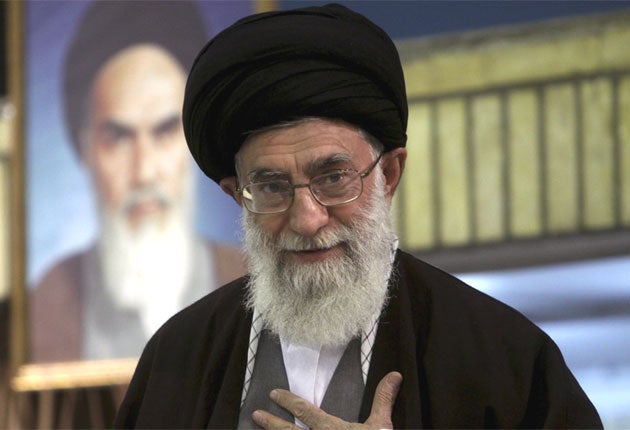We must fight Isis in Iraq — but not with the help of the malicious and mercenary Iran
Iran's religious fundamentalism is just as destructive as Isis's, yet the US has let it quickly take hold of the country

Your support helps us to tell the story
From reproductive rights to climate change to Big Tech, The Independent is on the ground when the story is developing. Whether it's investigating the financials of Elon Musk's pro-Trump PAC or producing our latest documentary, 'The A Word', which shines a light on the American women fighting for reproductive rights, we know how important it is to parse out the facts from the messaging.
At such a critical moment in US history, we need reporters on the ground. Your donation allows us to keep sending journalists to speak to both sides of the story.
The Independent is trusted by Americans across the entire political spectrum. And unlike many other quality news outlets, we choose not to lock Americans out of our reporting and analysis with paywalls. We believe quality journalism should be available to everyone, paid for by those who can afford it.
Your support makes all the difference.Iraq is burning, and despite efforts by the coalition against Isis, little has improved since the government lost control over large swathes of its territory last June.
Lawlessness, terrorism, corruption and the systematic abuse of human rights are each a daily feature of life in Iraq. It almost executes the highest number of people in the world, after only China and Iran. Women are constantly subject to rape and violence.
The current crisis, which has been burgeoning for years under the sectarian rule of former Prime Minister Nouri al-Maliki, is largely the product of a misguided post-invasion U.S. policy. The conflict has now been transformed into a formidable global threat.
The greatest blunder committed by the U.S. was to relinquish the emerging post-war order of Iraq, and hand it over to Iranian malice and mercenaries. This enabled the mullahs to achieve their three-decade-old policy of exporting their “Islamic revolution”.
Constitutionally, the export of Islamic fundamentalism by Iran underwrites their overall foreign policy. The Islamic Revolutionary Guards Corps (IRGC) and its extraterritorial arm, the Quds Force, have a mandate to execute that core objective.
Over the past decade, the Iranian regime has expanded its control in Iraq through the establishment and strengthening of Shiite militias. They have seized local control, and infiltrated pro-Iranian Iraqi fighters and groups into key positions within the political, military, security and economic structures in Iraq. They have managed to achieve all of this while deceiving the US that they were engaged in the mutually corresponding war against terror.
Iranian domination in Iraq has been fuelled by the withdrawal of US forces, combined with the Obama astonishing negligence of Iran's influence. On top of this, Nouri al-Maliki provoked widespread anger among the Sunni community during his premiership, by violently suppressing them and forcing their leaders into exile.
So what should the US do? Three months of coalition airstrikes have produced only modest gains in the absence of a reliable fighting force on the ground. Washington and Baghdad have failed to organize tribal and Sunni Iraqis who have a history of fighting al-Qaeda. The majority of Sunnis and Iraqi tribes who fought against Maliki until a few months ago have now left the scene, with some being recruited by Isis. The Sunnis simply do not have the motivation to become foot soldiers of a government that is still heavily influenced by the mullahs.
A solution to the crisis is hopelessly out of reach without the active and full participation of Sunnis and tribal forces in the reconstitution of the broken political process. This new and pro-active policy should include the rigorous restraining of Iranian influence in Iraq and the expulsion of its destructive proxies and Shiite militias, whose main objective has been to aggravate sectarian sensitivities and hostilities.
To defeat Isis the West needs a far more comprehensive response than mere airstrikes. It should be based on a cultural and religious alternative that can mount a strategic challenge to Isis' violent, fanatic and extremist view of Islam.
American support for a tolerant and democratic Islam that is indigenous to the Middle East will be instrumental in drying up the breeding ground of fundamentalism, whether in its Sunni form of Isis or its Shiite version of the Iranian regime and its merciless mercenaries. It is the only path to a peaceful resolution, and the one that the US must redirect itself towards.
Join our commenting forum
Join thought-provoking conversations, follow other Independent readers and see their replies
Comments